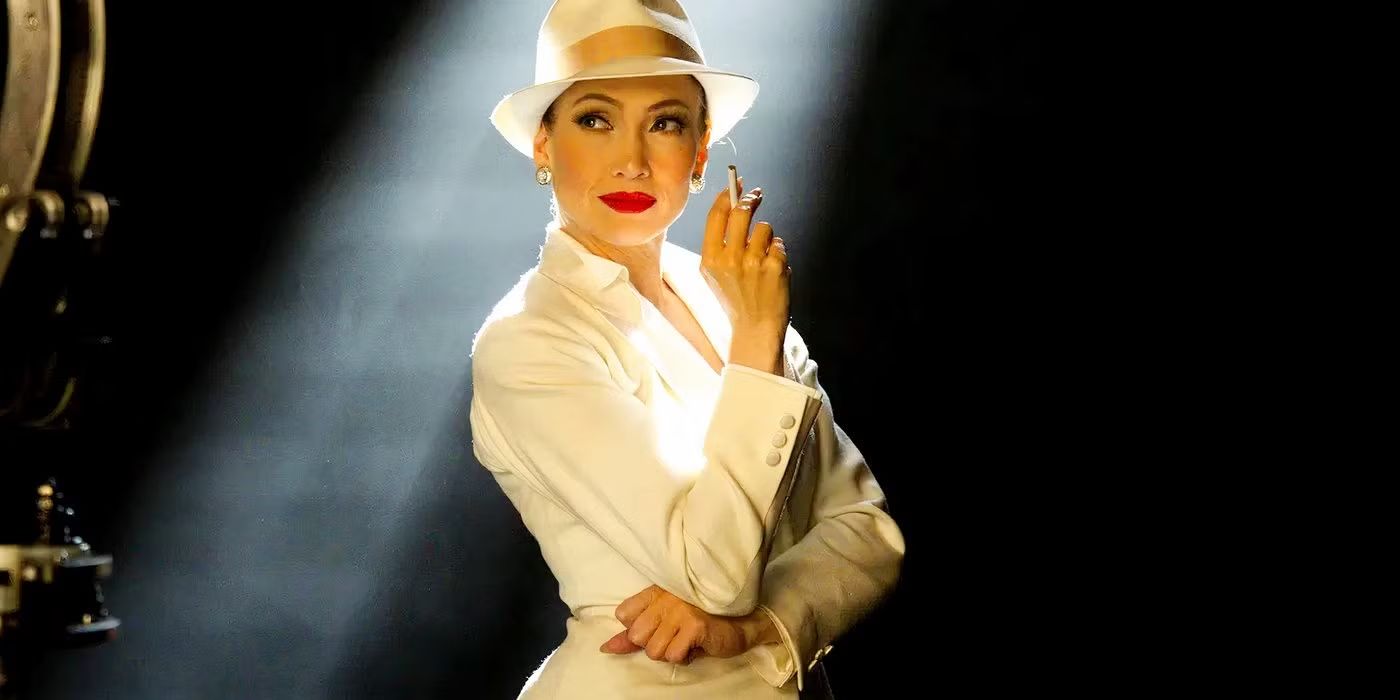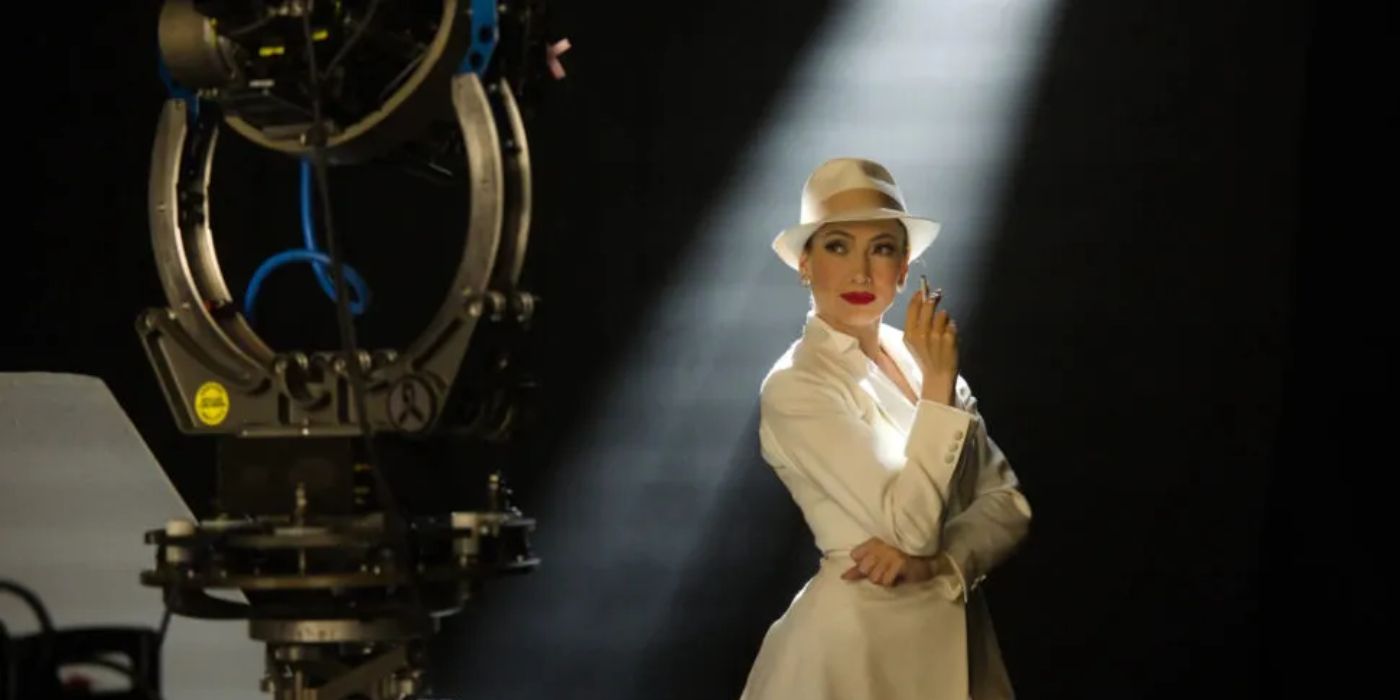
In Bill Condon’s movie “Kiss of the Spider Woman,” first released in 2025, the reflection of political repression in cinema is adorned with shimmering sequins, steeped in melancholy, and distorted by the very power structures it critiques. This film is an adaptation of Manuel Puig’s 1976 novel, as well as its stage musical version and the 1985 Oscar-winning film. The movie embraces its meta-musical structure, moving between the harsh conditions of an Argentine prison in 1981 and the captivating illusions of a Golden Age Hollywood imitation. It is both a tale of endurance and a contemplation on how cinema serves as a means of survival – showing how films can provide comfort amidst oppression, serve as a tool for control, or, at times, act as a form of resistance.
However, “Kiss of the Spider Woman” also wrestles with finding its unique identity as a film. Despite a captivating concept, an impressive ensemble including Jennifer Lopez, Diego Luna, and Tonatiuh, and a thoughtful exploration of Argentina’s Dirty War, the movie fails to commit fully to one genre: it oscillates between an introspective character study, a vivid blend of camp and tragedy, or a profound commentary on cinema, queerness, and political turmoil. Consequently, this ambitious musical falls short in fully realizing its most impactful themes.
The Prison as Cinema, the Cell as Stage
The film begins in May 1983, just ahead of Argentina’s military dictatorship’s downfall. The setting is a chilling prison, a rigid structure housing its own unique society, governed by rules distinct from the outside world. This internal society is ruthless, reflecting Argentina’s political oppression. At the lowest rung of this hierarchy is Luis Molina (Tonatiuh), a gay window dresser serving time for “corruption,” often ridiculed, assaulted, and degraded by being called a woman. Then, into his cell enters Valentin Arregui (Diego Luna), a Marxist revolutionary whose physical condition may be bruised but whose ideological zeal remains unshaken. The contrast is stark: Molina’s world revolves around movie-star fantasies and extravagant performances, while Valentin’s is grounded in harsh reality, resistance, and practicality.
In their early encounters, there’s a palpable air of social snobbery, political bias, and entrenched bigotry. “How insignificant you make yourself feel!” Valentin sneers, belittling Molina’s dreams. To him, films are nothing more than a narcotic, a diversion used to placate the masses by those in control. However, for Molina, movies serve as an escape, a means of coping with pain when all hope seems lost.
The balance between escaping reality and taking action, as well as whether films serve as instruments for freedom or oppression, is a key aspect that makes this movie stand out. However, instead of thoroughly exploring this complex relationship, Kiss of the Spider Woman tends to favor its lavish visuals over delving deeper into the ideological conflict at the core of its storyline. It leans more towards using spectacle rather than furthering the philosophical debate.
Jennifer Lopez and the Ghost of Golden Age Glamour

Jennifer Lopez is portrayed as Ingrid Luna, a movie star who transforms between various roles in Molina’s imaginings – Aurora, a captivating femme fatale; the Spider Woman, a legendary character whose kiss holds deadly power; and a sorrowful silver-screen idol, where her beauty serves as both her strength and her confinement. Lopez exudes an ethereal radiance, reminiscent of Rita Hayworth and Ava Gardner’s old Hollywood charm, and she is the film’s focal point, enveloped in satin and shrouded in shadows, her movements reflecting her dance and acting prowess.
Despite her captivating charm, she is merely a portrayal shaped by the men who envision her. Her existence is confined within their dreams—lacking authenticity as a fully developed character, instead serving as a symbol or embodiment of their yearnings. The movie fails to provide Ingrid Luna with independence beyond being the object of male desire, making her appear more like a character in an opulent dream rather than a character crucial to the emotional and political conflicts of the narrative.
This deliberate choice in “Kiss of the Spider Woman” reveals a significant shortcoming: The film becomes so captivated by its own artistry that it neglects to evoke the heavy impact of its characters’ realities. Although the movie-within-a-movie technique is effective as an artistic tool, it falls short in conveying the film’s broader themes of power, oppression, and passion.
The Cinematic Language of Oppression
In their work, director Condon and cinematographer Tobias Schliessler draw significantly from traditional Hollywood methods, adopting bright, high contrast lighting and meticulously planned framing to echo the dramatic opulence typical of 1940s melodramas. The flashbacks and dream sequences of Molina are portrayed in a manner reminiscent of Technicolor musicals, creating a stark contrast with the harsh, bleak atmosphere of the prison scenes. Furthermore, the use of black-and-white film stock for segments resembling newsreels serves to underscore the authenticity of Argentina’s Dirty War era, anchoring the movie in a time marked by genuine political turmoil.
From my perspective, if the movie aims to be a critique of cinema’s entanglement with authoritarian regimes, it seems to only touch upon this concept without fully immersing itself. The political landscape is broadly sketched, hinting at Argentina’s dictatorship, but not delving deeply into the intricacies. Apart from fleeting mentions of state monitoring, brutality, and cinema being used as a propaganda device, the movie fails to delve into the profound ramifications of its environment. At times, the Dirty War appears more as a scenic backdrop than a crucial narrative element.
A Musical That Can’t Find Its Rhythm

In terms of music, the adaptation of “Kiss of the Spider Woman” faces challenges. The score by John Kander and Fred Ebb, known for their work in “Cabaret” and “Chicago,” is as rich and dramatic as one would anticipate. However, on screen, it seems strangely soft. The movie frequently resembles a filmed stage musical, with minimal attempts to reinvent numbers in a way that feels cinematic. Unlike “Chicago” (also adapted by Condon), which utilized film’s language to amplify its theatricality, this rendition of “Kiss of the Spider Woman” remains stationary, with the numbers appearing more like disruptions than natural expressions of character.
The connection between Diego Luna and Tonatiuh is intriguing initially, yet it fails to develop sufficiently to truly impact us emotionally. In the movie, Valentin and Molina’s relationship evolves symbiotically – one learning about love from the other, and resistance in return. However, the film hurries through crucial scenes, often using dialogues that seem more like expository discussions than heartfelt emotional interactions.
In addition, there’s a conflicting balance between the film’s over-the-top style and its serious political intentions. At times, the movie embraces extravagant, dramatic excess; then, it demands we confront the harsh realities of torture and political oppression. This shift in tone creates a challenge when trying to get fully engrossed in either element.
A Beautifully Dressed but Thematically Uncertain Film

Molina expresses to Valentin in one of the movie’s more straightforward teaching moments that “acting true to yourself is like breaking the rules.” However, Kiss of the Spider Woman sometimes struggles to fully embody this rebellion. Though it presents potent concepts about cinema, longing, and political resistance, it doesn’t delve deep enough into these ideas for them to have a lasting impact.
In 1983, as Argentina’s dictatorship was falling apart, the true conflict was over memory – reclaiming stories that had been lost, resisting the government’s attempts to alter history. However, Kiss of the Spider Woman only hints at these issues without fully exploring them. Instead, it opts for general, easily understood themes about fascism and oppression, which, while powerful, seem too broad to capture the unique historical context it depicts.
In my view, “Kiss of the Spider Woman” is a film that delves into the depths of yearning – for companionship, for aesthetics, for liberation. Yet, it seems to be confined within its own lavish dreamworld. It boasts stunning visuals, melodious music, and thought-provoking ideas, but much like its main character, it finds itself stuck between illusion and truth, never fully embracing either. I had the pleasure of witnessing this captivating film at the 2025 Sundance Film Festival. For more details, you can explore here.
Read More
- 10 Most Anticipated Anime of 2025
- USD MXN PREDICTION
- Brent Oil Forecast
- Silver Rate Forecast
- USD CNY PREDICTION
- Pi Network (PI) Price Prediction for 2025
- USD JPY PREDICTION
- Gold Rate Forecast
- How to Watch 2025 NBA Draft Live Online Without Cable
- Castle Duels tier list – Best Legendary and Epic cards
2025-02-03 07:32